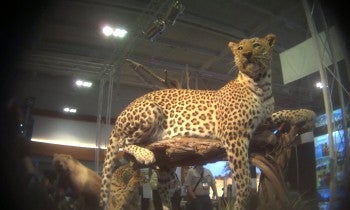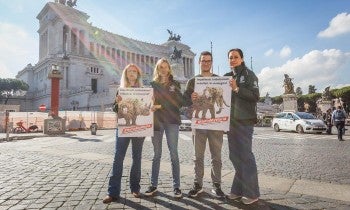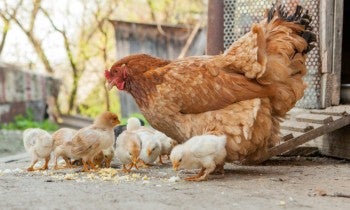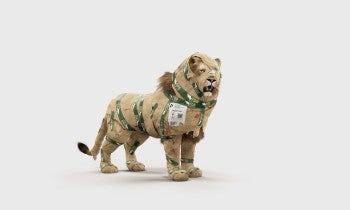Search
Found 4141 results
Speaker Bios for The Mitigation Potential of Plant-Based Diets: From Science to Policy
Jenny Chandler Alexandra Clark Dr. Doru-Leonard Irimie Florent Marcellesi, MEP Marie Persson Dr. Marco Springmann Cristina Tirado-von der Pahlen, DVM, MS, PhD Jenny Chandler Jenny Chandler is a freelance food writer and teacher based in Bristol, England. She has written a number of cook books
Statement on bill to kill street dogs and cats in Türkiye
Update, 9 August: The amendments to Animal Protection Law No. 5199 have been signed by President Erdoğan and published in the Official Gazette, which were the last steps before they could enter into force. Humane Society International will continue to follow the news from Türkiye and is ready to
Support Strong for an End to Wild Animal Acts in British Circuses
The number of circuses touring with wild animal acts in Britain has declined significantly in recent years, from 20 in 1997 to three as of December 2011. Among them, the three circuses are thought to use in the region of 40 wild animals, including lions, tigers, zebras, camels and various reptiles
Threats to Hares in the UK
The brown hare (Lepus europaeus) and the upland mountain hare (Lepus timidus) have suffered serious population declines during the last century, with brown hare numbers estimated to have plummeted by 80 percent since 1880. Habitat loss Much of the decline has been due to changes in land use and
Trophy hunting: Nine out of 10 Argentines are against this practice
BUENOS AIRES, Argentina—The vast majority of Argentine society opposes trophy hunting in the country and the export and import of trophies. This was demonstrated by the results of a recent survey conducted in Argentina in May 2022 regarding this practice, which consists of killing animals for
Undercover investigation at U.S. hunting convention exposes the sale of trophy hunts and products of imperiled and endangered species
BRUSSELS—A shocking undercover investigation released by the Humane Society of the United States and Humane Society International exposed the hypocrisy that the trophy hunting industry uses to promote the killing of imperiled species. The Safari Club International convention in Nashville, Tennessee
Trophy hunting is back on the Italian political agenda
BRUSSELS —The issue of trophy hunting is back on the Italian political agenda with the new presentation by Hon. Michela Vittoria Brambilla of a bill aimed at banning the import, export and re-export, to and from Italy, of hunting trophies obtained from animals who are protected by CITES (the
Undercover investigation at six Las Vegas-area pet stores reveals consumer deception and sick, dying puppies
An undercover investigator for the Humane Society of the United States worked at six pet stores across Nevada—including Puppy Heaven in Las Vegas, Petland in Henderson, and four different Puppies for Less stores in Las Vegas—during late 2024 and found unsafe housing, managers failing to seek
Undercover investigation: Holiday shoppers urged to avoid supporting cruel puppy mills
Amidst the holiday season—the busiest puppy-buying time of the year—the Humane Society of the United States warns consumers against purchasing a puppy from a pet store and inadvertently supporting the puppy mill industry. An undercover investigation by the HSUS is exposing unsafe and filthy
In time for World Egg Day on October 14, Sofitel Saigon Plaza implements its cage-free egg commitment
Update: As of May 2021, Sofitel Saigon Plaza has published that it no longer buys eggs from caged hens. HO CHI MINH CITY, Viet Nam—Humane Society International, a global animal welfare organization, congratulates Sofitel Saigon Plaza—one of Accor’s international hotel brands—for their efforts to
Undercover Investigations Reveal Abuse of Tiger Cubs at Roadside Zoos
Editor’s Notes: In response to the HSUS undercover investigation at Natural Bridge Zoo, the USDA conducted a four-day inspection and cited the roadside zoo for 31 violations (PDF) of the federal Animal Welfare Act. This includes animals going without basic necessities such as veterinary care, food
Trophy hunting resources
Trophy Hunting by the Numbers: The European Union’s role in global trophy hunting Import and Export of CITES listed species between 2014 and 2018 /sites/default/files/uploads/2021/06/Trophy-hunting-numbers-eu-report.pdf Summary from Trophy Hunting by the Numbers report /sites/default/files/uploads
Virtual lion joins African elephants and black rhinos in urging the EU Commission to restrict imports of trophies from species at risk of extinction
BRUSSELS—Today, on International Endangered Species Day, Humane Society International/Europe is launching a new image under its #NotInMyWorld campaign featuring the image of an African lion trophy who has been packaged for shipping. The #NotInMyWorld campaign aims to raise awareness about the
Victorie: România interzice fermele de blănuri!
BUCUREȘTI—Humane Society International/Europe sărbătorește astăzi o victorie majoră pentru protecția animalelor din România, după ce Parlamentul României a votat cu o majoritate covârșitoare pentru interzicerea fermelor de șinșile și nurci, singurele ferme de blănuri din țară. Această decizie




